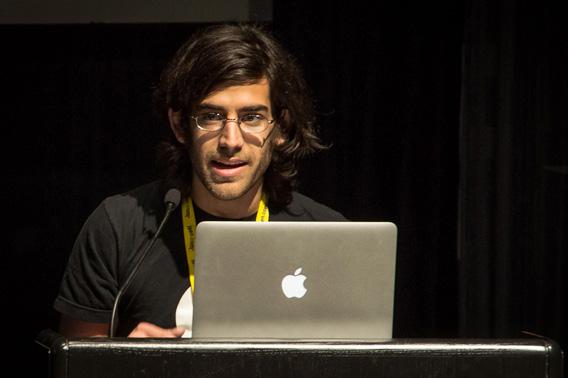Crime is Slate’s crime blog. Like us on Facebook, and follow us on Twitter @slatecrime.
Earlier this morning, the Senate Judiciary Committee grilled Attorney General Eric Holder on topics ranging from drones to marijuana policy. About an hour into the oversight hearing, Sen. John Cornyn, a Republican from Texas, asked Holder about the DOJ’s prosecution of Aaron Swartz, the programmer and Internet activist who committed suicide in January. Among other things, Swartz had been charged under the Computer Fraud and Abuse Act for using MIT’s computer network to unauthorizedly download millions of academic journal articles from a subscription database called JSTOR. He was facing a maximum sentence of 50 years in prison.
Many people, most notably Swartz’s family and friends, have argued that the charges he was facing were out of proportion to his alleged crime. But Holder rejected the notion that the prosecutors had been overzealous, noting that Swartz had been consistently offered plea bargains that would’ve required him to spend only a few months in prison. “There was never an intention for him to go to jail for longer than a three-, four-, potentially five-month range,” said Holder.
Watching the livestream of the session, I was astounded at how freely Holder admitted that this was the goal all along. So was Cornyn, apparently, and he followed up with an excellent question: “Does it strike you as odd that the government would indict someone for crimes that would carry penalties of up to 35 years in prison and million dollar fines, and then offer him a three- or four- month prison sentence?” (Swartz was actually facing up to 50 years in prison.)
Holder responded that, no, he didn’t think it was odd at all. Cornyn pressed the point:
Cornyn: So you don’t consider this a case of prosecutorial overreach or misconduct?
Holder: No, I don’t look at what necessarily was charged as much as what was offered, in terms of how the case might have been resolved.
That’s just stupid. It’s impossible to decouple the charges in a case from its potential resolution. As Cornyn went on to note, the whole point of a lengthy maximum sentence like the one Swartz was facing is to intimidate defendants into pleading guilty. In an email this afternoon, Swartz’s lawyer, Elliot Peters, told me that the prosecutors made it very clear: If the case went to trial, and if Swartz lost, they would recommend a guidelines sentence of seven years in prison. “While what [Holder] states appears literally accurate, he is avoiding confronting some issues that are troubling,” Peters told me. Among those issues: “Why was jail necessary in this case at all? Why 13 felony counts? Why such a disparity between the punishment warranted on a plea and after a trial?”
The DOJ may have only intended for Swartz to go to jail for a couple months. It’s clear, though, they would’ve had no problem with sending him away for a few years, too. I think Sen. Cornyn put it nicely: “If you’re an individual American citizen, and you’re looking at criminal charges being brought by the United States government, with all of the vast resources available to the government, it strikes me as disproportionate, and one that is basically being used inappropriately, to try to bully someone into pleading guilty to something that strikes me as rather minor.”
Holder claimed that the Department of Justice had conducted “a good examination” of the Swartz prosecution, and came away from it satisfied that there had been no prosecutorial misconduct. And maybe there wasn’t, if you’re judging the prosecutors on whether they deviated from standard DOJ practice. But there is a flaw in the system if the DOJ’s best route to get the sentence it’s looking for is to threaten defendants with disproportionate prison terms. That might be an effective prosecutorial tactic, but that’s not justice.
